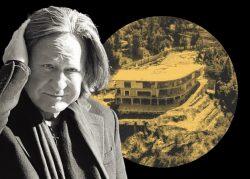Strada Vecchia won’t die but taxes are certain to remain a factor in the ongoing drama over the unfinished Bel Air spec mansion.
The battle over Mohamed Hadid’s infamous, court-controlled, 30,000-square-foot property has dragged on for the better part of a decade, with an only-in-L.A. cast of characters that starts with the brash celebrity developer and includes irate neighbors, various public officials, 12 jurors, a luxury auctioneer and, of course, teams of expensive lawyers.
Now the fate of the property –– where $50 million was once bandied about as a benchmark value –– might hinge on negotiations over $1.6 million in back property taxes.
“I’m hoping that’s the missing piece,” said Joe Horacek, who lives down a slope from the doomed mansion and was a plaintiff in a civil case against Hadid. “But then again the receiver has made it very clear that his negotiations with the prospective purchasers are generally confidential.”
Horacek, along with other neighbors who view the property as a looming threat, are hoping the tax negotiations will help spur a long-awaited deal that finally results in a tear down.
“It scares us dramatically,” Horacek said earlier this month of the half-built mansion.
HIs fear is that rains or other conditions could cause parts of the unfinished building to collapse and slide downhill. This week’s rain, Horacek added, had sent rocks cascading into his driveway.
“The hillside is unstable, and there were slides,” he said.
Strada Vecchia, once intended as a hilltop dream mansion — and dubbed “Starship Enterprise” by critics, because of its saucer shape — has long ranked among L.A.’s most contentious luxury projects. The construction has prompted both a criminal case, in which Hadid pleaded no contest to charges related to violating construction permits. There also was a civil case, withHoracek and three other plaintiffs alleging the construction had caused damage to their properties, and that the City of L.A. was failing to enforce its own building codes by allowing the construction to stand.
In late 2019, an L.A. County judge agreed the building was unsafe and ordered it demolished. The judge also put the property into receivership.
Two years later, to the consternation of critics, Strada Vecchia is still standing, largely because of a lack of funds to pay for an expensive tear down.
Earlier this year, after failing to find a buyer on the market, the court put the property up for auction. Court-appointed receiver Douglas Wilson has recently been in talks with at least one potential buyer, Sahara Construction Company. Yet no deal has been finalized, and Wilson also has meanwhile been negotiating with the Los Angeles County’s tax assessor to lower the bill for back-taxes on the property.
“That’s part of the negotiation,” Wilson said earlier this month.
But the tax question, like so much else with Strada Vecchia, has also dragged on: A final hearing on the matter had been scheduled for last week but was delayed until next month.
A cut in the tax bill could clear a path to a sale. The court-run auction over Strada Vecchia had been set to conclude Oct. 1, but the four bids received all came in under the property’s $5.5 million listing price, prompting a judge to reject the offers and instruct Wilson to engage the highest bidders in further discussions.
A receiver in cases will generally seek a price high enough to cover the costs of demolition, back taxes and any other obligations tied to the property.
Sahara had bid $5 million for the property, and after the discussions expressed interest in maintaining that bid but paying for the demolition itself, to save the county that expense.
At least some reduction in the amount owed is likely, according to receiver Wilson.
Municipal tax authorities have some negotiating leeway.
“Let’s just say they would have, in general, more leverage than an unsecured creditor, because of their priority status under the law,” said Nate Bernstein, an attorney with the LA Real Estate Law Group.
A significant cut in the $1.6 million property tax bill could put Sahara or other bids that fell several hundreds of thousands of dollars below the minimum in range.
It wouldn’t be the first roll-back by the receiver.
Wilson had first listed the property in January for $8.5 million, then, in consultation with the broker facilitating the auction, reduced it to $5.5 million in the hopes of enticing competing bidders. Hadid bought the high-profile site in 2011 and was sentenced to community service in 2017. In September a jury awarded the Horaceks and another couple $3 million in damages stemming from the construction, a fraction of what the neighbors had been seeking.
Read more


